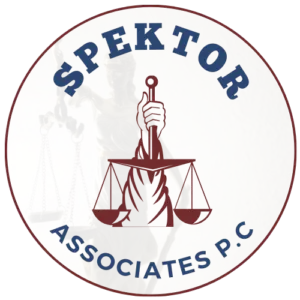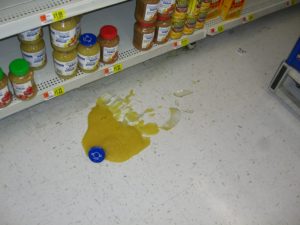When you go into a store to do some shopping, you wouldn’t expect to walk out with an injury. Getting a slip and fall injury is probably the last thing on your mind and you might be left wondering what caused the accident and if there’s anyone liable.
In most cases, the store or property owner is liable for causing your accident. It rests upon the storekeeper to protect his customers from any risks and dangers inside the store or in the surroundings.
Negligence on their part might have unintentionally created a potentially dangerous situation that ended up causing you harm. You might also find that they ignored a safety hazard that led to you getting injured.
However, many store owners are not usually the owners of the property and often get them by leasing. As such, the property landlord in some cases is rendered liable for your injury. It takes a skilled lawyer to determine who is liable and how to get them to compensate you.
Here are a few facts that might help you understand more about slip and fall accidents in New York.
Premises Liability; What Exactly Is It?
Premises liability is the legal term for this type of injury. This liability dictates that the business holder has a duty to protect their customers and keep their property safe. The business has to take steps to ensure regular inspection of the property to certify it as safe for the movement of customers in and out of the store, including the parking lot. They are to identify and effectively warn the customers or block off any dangers that are present.
Should You Sue the Store Owner or the Property Owner?
Many people believe that their accidents are a result of their clumsiness or carelessness. This belief leads to general embarrassment after a fall in the store or on adjacent properties. Most people then end up not claiming any compensation from the store. Here are some examples of negligence that can give you more context to help you understand the situation better as the claimant.
An incident that occurs due to a spill on the floor be it a soft tissue injury or a severe injury, means that the business failed to keep the floor free of any dangers to customers. Leaving debris on the floor also means they are liable for any accidents that the debris causes.
If you got injured as a result of a structural issue in the building or parking lot, the property holder should be liable for the incident.
Suppose you tripped over a pothole in the parking lot or slipped because of a water leak. In that case, you should sue the property possessor because these are structural failures in that area, causing avoidable accidents.
If you slipped because the store recently polished their floor with slippery wax, the storekeeper is responsible for your injuries. If you tripped over something left intentionally on the floor, the storekeeper is also liable.
When you get in an accident in the parking lot because of poor lighting conditions, the business is aware of criminal activity. Still, it fails to prevent an attack on its customers in the parking lot. A store has a duty to provide a safe environment for its customers. This environment includes the parking lot.
When a shelf topples, causing injury to customers near it. The store owner should ensure the structures they expose the public to while inside the store are stable and safe.
These are some of the examples of accidents that could happen inside a store, most of which are directly attributed to negligence. Some cases are, however, not so direct and a competent legal practitioner can help distinguish among them.
Here are a few examples:
- When a customer trips over their laces inside the store, it doesn’t fall within the storekeeper’s duties to ensure your laces are tied.
- A fall caused by objects you were carrying.
- Injury due to burns from your cup of coffee
- A slip because of a spill you caused.
- Injury due to a slip where there is adequate signage warning customers of a slippery floor.
- Injury as a result of carelessness on the part of the customer.
- Intentional self-harm inside the store or its premises.
A Broader Look at Slips
As you have seen, most injuries inside stores happen as a result of a slip and fall accident. This heightened risk is why store owners are required to warn customers of a slippery floor with adequate signage. Substances such as water, oil leaks, snow, debris, floor polish, and mud can all cause slips.
Should you fall inside a store, try and look around for clues about what might have caused your slip, including your shoes.
Steps to Follow After You Get Injured in a Store On Its Premises
Following an injury at the store, the first step should be to see a health professional. To avoid any complications resulting from your injury, you should seek medical help before you decide on any other course of action. Do not take lightly the medical advice provided. You might find things are worse than they look from the onset and you might have to do a few emergency room visits.
In the build-up to your case, it is essential to consider a few factors regarding your accident.
Ensure You File Your Claim at The Right Time
It would help if you got in touch with a slip and fall lawyer as soon as possible after an incident at a store. Some victims tend to wait until they fully recover from their wounds to start the process of filing their personal injury cases.
The reason you should act fast is that some states have a period within which you are allowed to file for compensation. After this period has expired, you will not be allowed to file a case. A good slip and fall lawyer will advise you on this and act within the stipulated period to ensure you get compensated for damages.
Consider How Long the Object or Spill or Debris Was on the Floor
To win this kind of case, you should be able to prove that the store owner knew the floor was unreasonably slippery. The longer the spill was on the floor, the higher your chances of proving negligence on the store owner’s part. The landlord has a duty to their customers to clean the property for safety purposes and aesthetics.
If another shopper spilled something that you slipped over a few seconds later, the store owner wouldn’t be held liable. This is because the time was not adequate to allow for cleaning or clearing of debris. Therefore the longer the object or spill was on the floor, the higher the chances of neglect.
Consider Any Warning Signage Present
Regular floor polishing is a good practice among many store owners across the country. Floor polish, however, poses a danger to customers due to its slippery nature. Therefore, store owners are required to display adequate signage of a slippery floor due to polish or regular cleaning.
In some cases, stores must cordon off an area until the floor gets safe for use. Failure to display signage is considered negligence in a court of law. On the other hand, putting up a sign does not absolve the store owner of any wrongdoing in the case a customer slips and falls inside their properties.
It takes a skilled lawyer to find these faults.
Consider Restricted Areas Within the Premises
Suppose you entered a restricted area in the store and got injured there. Who then bears liability for your damages? The fact that you entered a restricted area will lower your chances of winning the case. It, however, does not mean the store owner is completely innocent. Consult with a good lawyer who can help you determine liability in this case.
Request for an Accident Report From The Police
An accident report from the police can be of great help to your case. These reports can help reveal to the court other possible cases of carelessness by the store or property owner.
After obtaining similar reports, you should then obtain receipts and medical records to show that you indeed sought treatment and that it did cost you some money. This can help you get compensation for any hospital bills and follow-up visit costs you incurred.
You should also compile records that show your proof of work, proof of salary, or any compensation you receive while at work. These records will help both you and the court determine how much money you lost due to absenteeism caused by your injury. The store owner should adequately compensate you for any opportunity you missed as a result of your injuries. Such records will help you a great deal when claiming compensation from the store or property owner.
Injury-Related Claims That Are Eligible For Compensation
Walking into a store doesn’t have to be life-threatening. Every customer deserves to be able to shop safely and conveniently. When you get injured in a store, you should know that it is within your rights to ask to get compensation for your damages and troubles. It is therefore essential that you know what will constitute your compensation claim. In case of injury, the store or property owner should compensate you for
- The costs are directly related to your wounds, such as ambulance costs, injury treatment such as stitching and dressing the wound, any follow-up hospital visits, and medicines you bought.
- The loss of income you suffer as a result of the damages. This includes any income you anticipated getting.
- The embarrassment you suffered as a result of falling and getting injured in public. This is considered emotional damage.
- Adequate compensation in the unfortunate case of death due to an injury or damage in the store.
- Any other costs that you can relate to your injury. These include the cost of hiring a nurse for home care and additional costs of transport due to reduced mobility.

Working With a Personal Injury Attorney
When you walk into a store in New York City, the store should ensure your safety for the period you are on their property. The law says that the store owner or property owner should compensate you if you incur an injury while shopping in the store. A skilled lawyer will help you build up a case, file it and take you through the compensation process, making it as smooth as possible for you.
Get the Compensation You Deserve
As per the law, businesses and property owners owe their customers a safe shopping environment. The law also dictates that they should adequately compensate you for an injury due to their carelessness.
To get fully compensated, you will need the services of a personal injury law firm. Get in touch with Gregory Spektor & Associates P.C today on (800)-318-8888 to get the compensation you deserve.



